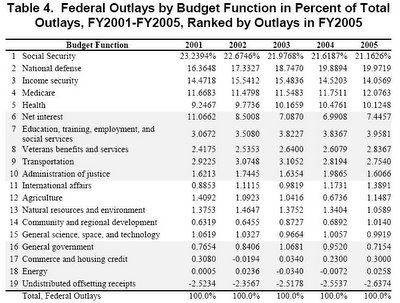The top six budget functions, combined, accounted for 86.1% of federal expenditures in 2001 and 84.8% of federal expenditures in 2004. Five of the six (Social Security, Income Security (which includes unemployment compensation, food and nutritional assistance, and federal civilian and military retirement), interest on the federal debt, Medicare, and health benefits (which include Medicaid) are not discretionary. Moreover, as the report notes, "much less than the 30% to 40% of the budget considered discretionary can be reduced through appropriations alone" because:
Even the 30% to 40% of the budget that is subject to annual appropriations is not completely discretionary. Much of the annual appropriated amounts are necessary to fulfill legal commitments that the government had entered into in previous time periods, such as contracts or other obligations. Unless Congress and the President are willing to eliminate programs and the federal employees that run them, a certain amount of the annual appropriations are needed for federal salaries. In addition, approximately half of the annual appropriated amount goes to defense spending, which during a time of war is difficult to reduce.The report has a table which shows federal outlays by budget function expressed as a percent of total outlays:
 (Click to enlarge.)
(Click to enlarge.)Of course, there are winners and losers. Thus, there has been a dramatic increase in expenditures on the Executive Office of the President from $246 million to $7.725 billion. (For you math majors, that means that the amount of spending in 2005 was 31.4 times that for 2001.) Of course, there had to be some belt-tightening. The EPA, for instance, was held to an increase of only a little over 7% for the period covered, with spending actually falling from 2004 to 2005.
The summary of the report has it right:
Without a substantial reordering of the public's priorities as reflected in the government's allocation of resources, most spending reduction efforts seem destined to remain relatively small and, thus, are likely to have a limited effect on overall federal spending.Hat tip to beSpacific.
No comments:
Post a Comment